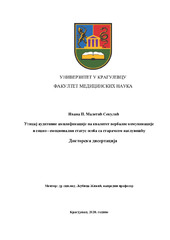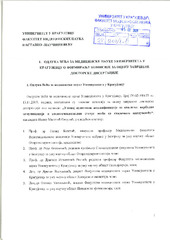Приказ основних података о дисертацији
Uticaj auditivne amplifikacije na kvalitet verbalne komunikacije i socio - emocionalni status osoba sa staračkom nagluvošću
| dc.contributor.advisor | Živić, Ljubica | |
| dc.contributor.other | Baletić, Nenad | |
| dc.contributor.other | Kosanović, Rade | |
| dc.contributor.other | Ignjatović-Ristić, Dragana | |
| dc.contributor.other | Vasiljević, Dragan | |
| dc.creator | Maletić-Sekulić, Ivana | |
| dc.date.accessioned | 2020-10-24T12:35:09Z | |
| dc.date.available | 2020-10-24T12:35:09Z | |
| dc.date.issued | 2020-07-28 | |
| dc.identifier.uri | http://eteze.kg.ac.rs/application/showtheses?thesesId=7555 | |
| dc.identifier.uri | https://fedorakg.kg.ac.rs/fedora/get/o:1270/bdef:Content/download | |
| dc.identifier.uri | https://nardus.mpn.gov.rs/handle/123456789/17549 | |
| dc.description | Staračka nagluvost, presbiakuzija (presbyacusis) podrazumeva obostrani, progresivni, senzorineuralni gubitak sluha. Ona predstavlja najčešći senzorni deficit sluha kod starijih osoba i jedan je od vodećih hroničnih zdravstvenih i društvenih problema starije populacije. Oštećenje sluha može da naruši ekspresivni i receptivni govor, ugrozi razmenu informacija i komunikaciju, dovede do ispoljavanja simptoma anksioznosti, a samim tim i značajno oteža svakodnevni život osoba sa staračkom nagluvošću, što ukazuje na kompleksnost ovog senzornog deficita. Cilj istraživanja je procena uticaja staračke nagluvosti na razumljivost govora, kvalitet verbalne komunikacije i socio - emocionalni status osoba sa ovim problemom. Istraživanje je sprovedeno na Odseku audiologije i vestibulologije KBC ''Zemun'', u Beogradu, u periodu od aprila 2016. do septembra 2017. godine. Istraživanjem je obuhvaćeno 120 ispitanika, oba pola, starosti 46 - 85 godina, sa dijagnozom presbiakuzije. Svi ispitanici su bili audiološki opservirani, prema planiranom protokolu, a definisanim alatima prikupljeni su relevantni podaci o proceni subjektivnog doživljaja slušne onesposobljenosti, govorno - jezičkom statusu i prisustvu anksioznosti. Kod ispitanika obe grupe, sa i bez slušne rehabilitacije, je nakon godinu dana sprovedeno ispitivanje istim postupkom (retest) čime je izvršena procena promena zadatih parametara. Rezultati istraživanja su pokazali negativan uticaj oštećenja sluha na subjektivnu procenu slušne onesposobljenosti (p = 0.002, za p < 0.05) sa većom slušnom onesposobljenošću posle godinu dana (test / M 44.29, SD 15.73; retest / M 49.29; SD 15.73) u grupi bez sprovedene slušne amplifikacije, što potvrđuje dosadašnje stavove o negativnom uticaju oštećenja sluha na celokupni život čoveka i produbljivanje tegoba ukoliko izostane korekcija sluha. Osećaj anksioznosti kao trenutnog stanja je izraženiji u grupi ispitanika kod kojih nije primenjena auditivna amplifikacija (p = 0.001, za p < 0.05; test / M 43.57; SD 6.14); retest / M5 45.83; SD 5.93), ali i anksioznosti kao stanja koje je izmenilo ponašanje osobe kao celokupne ličnosti (p = 0.001, za p < 0.05; test / M 41.86; SD 7.70; retest / M 44.31; SD 7.19). Ispitanici bez sprovedene slušne amplifikacije imaju više problema u razumevanju govora (r = 15.995, df = 2, p = 0.000) u odnosu na ispitanike sa amplifikacijom (sa amplifikacijom / M 8.74; SD 1.269; bez amplifikacije / M 7.57; SD 1.246). Ispitanici sa slušnom amplifikacijom imaju izraženiji poremećaj artikulacije, distorzija u izgovoru suglasnika zapažena je kod 23.3% u odnosu na ukupan broj glasova u srpskom jeziku, kao i 28% u izgovoru konsonanata. Na osnovu rezultata istraživanja zaključili smo da oštećenje sluha kod osoba sa presbiakuzijom negativno utiče na govorno - jezički status i komunikacione sposobnosti, subjektivni osećaj slušne onesposobljenosti i pojavu anksioznih manifestacija. Takođe poremećaj artikulacije kod ispitanika sa sprovedenom slušnom amplifikacijom ukazuje na neophodnost uvođenja novih protokola slušne rehabilitacije u cilju postizanja maksimalnog efekta amplifikacije i kvalitetnog slušanja, uspešne socijalne integracije osoba sa presbiakuzijom i smanjenja onesposobljenosti. | sr |
| dc.description | Elderly hearing loss, presbycusis, implies a two - sided, progressive, sensorineural hearing loss. It is the most common sensory deficit in the elderly and is one of the leading chronic health and social problems of the elderly population. Hearing damage can impair expressive and receptive speech, disable information exchange and communication, lead to the manifestation of symptoms of anxiety, and hence significantly complicates the everyday life of people with aging, indicating the complexity of this sensory deficit. The aim of the research was to evaluate the impact of elderly hearing loss on the comprehensibility of speech, the quality of verbal communication, the socio-emotional status of those with this problem. The research was conducted at the Department of Audiology and Vestibulology KBC "Zemun", in Belgrade, from April 2016th to September 2017th. The study covered 120 subjects, both sexes, aged 46 - 85, with a diagnosis of presbycusis. All subjects were audiologically observed, according to the planned protocol, and with the defined tools collected relevant data on the assessment of the subjective experience of hearing impairment, speech - language status and the presence of anxiety. After a year, both groups of respondents were tested with the same procedure (retest), which made an assessment of the changes in the given parameters in the subjects with and without auditory rehabilitation. The results of the study showed a negative impact of hearing impairment on a subjective assessment of hearing impairment (p = 0.002, p < 0.05) with higher hearing impairment after one year (test / M 44.29, SD 15.73; retest / M 49.29; SD 15.73) in the group without the performed auditory amplification, which confirms the previous views on the negative impact of hearing impairment on the entire life of a person and the deepening of the disability if there is no hearing correction. The feeling of anxiety as the current state is more pronounced in the group of subjects with no auditory amplification (p = 0.001, for p <0.05; test / (M 43.57; SD 6.14); retest / M 45.83; SD 5.93), but also anxiety as a condition which changed the behavior of the person as a whole personality (p = 0.001, for p <0.05; test / M 41.86; SD 7.70; retest / M 44.31; SD 7.19). Respondents with no auditory amplification have more problems in understanding speech (r = 15.995, df = 2, p = 0.000) compared to7 amplification subjects (with amplification / M 8.74; SD 1.269; without amplification / M 7.57; SD 1.246). Respondents with hearing amplification have a more pronounced articulation disorder, distortion in the pronunciation of the consonant is noted at 23.3% in relation to the total number of vocals in the Serbian language, as well as 28% in the pronunciation of the consonant. Based on the results of the research, we concluded that hearing impairment in people with presbycusis negatively affects the speech - lingual status and communication skills, the subjective feeling of hearing impairment and the occurrence of anxiety manifestations. Also, the disorder of articulation among the respondents with the performed auditory amplification indicates the necessity of introducing new auditory protocols in order to achieve the maximum effect of quality listening, successful social integration of people with presbycusis and reduction of disability. | en |
| dc.format | application/pdf | |
| dc.language | sr | |
| dc.publisher | Универзитет у Крагујевцу, Факултет медицинских наука | sr |
| dc.rights | openAccess | en |
| dc.rights.uri | https://creativecommons.org/licenses/by-nc-nd/4.0/ | |
| dc.source | Универзитет у Крагујевцу | sr |
| dc.subject | presbiakuzija | sr |
| dc.subject | presbycusis | en |
| dc.subject | razumljivost govora | sr |
| dc.subject | artikulacija | sr |
| dc.subject | anksioznost | sr |
| dc.subject | slušna onesposobljenost | sr |
| dc.subject | rehabilitacija sluha | sr |
| dc.subject | speech comprehensibility | en |
| dc.subject | articulation | en |
| dc.subject | anxiety | en |
| dc.subject | hearing impairment | en |
| dc.subject | hearing rehabilitation | en |
| dc.title | Uticaj auditivne amplifikacije na kvalitet verbalne komunikacije i socio - emocionalni status osoba sa staračkom nagluvošću | sr |
| dc.type | doctoralThesis | en |
| dc.rights.license | BY-NC-ND | |
| dcterms.abstract | Живић, Љубица; Косановић, Раде; Васиљевић, Драган; Игњатовић-Ристић, Драгана; Балетић, Ненад; Малетић-Секулић, Ивана; Утицај аудитивне амплификације на квалитет вербалне комуникације и социо - емоционални статус особа са старачком наглувошћу; Утицај аудитивне амплификације на квалитет вербалне комуникације и социо - емоционални статус особа са старачком наглувошћу; | |
| dc.identifier.fulltext | https://nardus.mpn.gov.rs/bitstream/id/66185/Izvestaj_Ivana_SekulicMaletic_Medicina.pdf | |
| dc.identifier.fulltext | https://nardus.mpn.gov.rs/bitstream/id/66184/Disertacija.pdf | |
| dc.identifier.rcub | https://hdl.handle.net/21.15107/rcub_nardus_17549 |



